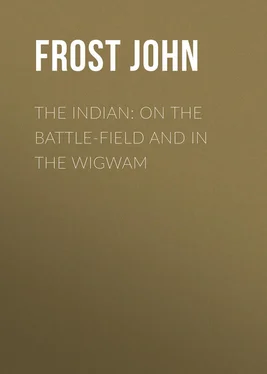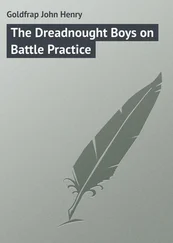John Frost - The Indian - On the Battle-Field and in the Wigwam
Здесь есть возможность читать онлайн «John Frost - The Indian - On the Battle-Field and in the Wigwam» — ознакомительный отрывок электронной книги совершенно бесплатно, а после прочтения отрывка купить полную версию. В некоторых случаях можно слушать аудио, скачать через торрент в формате fb2 и присутствует краткое содержание. Жанр: foreign_antique, foreign_prose, на английском языке. Описание произведения, (предисловие) а так же отзывы посетителей доступны на портале библиотеки ЛибКат.
- Название:The Indian: On the Battle-Field and in the Wigwam
- Автор:
- Жанр:
- Год:неизвестен
- ISBN:нет данных
- Рейтинг книги:5 / 5. Голосов: 1
-
Избранное:Добавить в избранное
- Отзывы:
-
Ваша оценка:
- 100
- 1
- 2
- 3
- 4
- 5
The Indian: On the Battle-Field and in the Wigwam: краткое содержание, описание и аннотация
Предлагаем к чтению аннотацию, описание, краткое содержание или предисловие (зависит от того, что написал сам автор книги «The Indian: On the Battle-Field and in the Wigwam»). Если вы не нашли необходимую информацию о книге — напишите в комментариях, мы постараемся отыскать её.
The Indian: On the Battle-Field and in the Wigwam — читать онлайн ознакомительный отрывок
Ниже представлен текст книги, разбитый по страницам. Система сохранения места последней прочитанной страницы, позволяет с удобством читать онлайн бесплатно книгу «The Indian: On the Battle-Field and in the Wigwam», без необходимости каждый раз заново искать на чём Вы остановились. Поставьте закладку, и сможете в любой момент перейти на страницу, на которой закончили чтение.
Интервал:
Закладка:
“My father!” said Tecumseh, with sublime dignity, “the sun is my father, and the earth is my mother, and on her bosom will I repose,” and immediately seated himself upon the ground. When the council had concluded, Tecumseh expressed his intention to fight rather than yield the ground. “It is my determination,” said he, “nor will I give rest to my feet until I have united all the red men in the like resolution.”
The threat was soon executed. The active chief visited all the western tribes from the Winnebagoes to the Creeks, and made use of all means of persuasion to unite them, with one aim, the maintenance of their country free from the rule of the white man. Superstition is mighty among the red men, and Tecumseh had the means of turning it to his purpose. His brother, the well-known Prophet, (Ellskwatawa,) had obtained a reputation among the neighboring Indians, as a medicine-man and conjurer. He announced that the Great Spirit had conversed with him, and commissioned him to restore the red men to their primitive power. The Indians believed in the truth of the commission, and the Prophet, by his craft and eloquence succeeded in gaining an influence among them, second only to that of his great-spirited brother. A formidable confederacy was soon formed of which Tecumseh was the head.
The battle of Tippecanoe was fought on the night of November 6, 1811, in which sixty-two Americans were killed and one hundred and twenty-six wounded. The Prophet is said to have conducted the attack, but did not expose himself to danger. The vigilance of Harrison, and the bravery of his men, repulsed the Indians, inflicting upon them a severe loss. Tecumseh was not in the battle.
When the war broke out between Great Britain and the United States, Tecumseh seized the opportunity to join the British general with a large body of his warriors. He received the commission of brigadier-general in the British army. During the latter part of his active life, he was under the direction of General Proctor; but is said to have been greatly dissatisfied with his proceedings. After Perry’s victory on Lake Erie, Proctor abandoned Detroit, and retreated up the Thames, pursued by General Harrison, with the American army. Harrison overtook him near the Moravian town, on the 5th of October, 1813. By a novel manoeuvre, ordered by Harrison, and executed by Colonel Johnson, the British line was broken and put to flight.
The Indians, commanded by Tecumseh, maintained their ground, with a noble determination. The great chief fought with desperation, until a shot in the head from an unknown hand, laid him dead upon the field. His warriors, as if they had lost their spirit, then fled, leaving about one hundred and twenty men dead upon the field.
Tecumseh was about forty-four years of age when he fell. He was about five feet ten inches in height, and of a noble appearance. His carriage was erect and lofty – his motions quick – his eyes keen, black, and piercing – his visage stern, with an air of hauteur, which expressed his pride of spirit. He is said to have been reserved and stern in his manners. After his fall, the Indians became anxious to secure peace, convinced that their cause was hopeless. The Prophet lost their confidence, and sunk into insignificance.
THE DESTRUCTION OF MONTREAL
BOUT 1687, the Iroquois, from some neglect on the part of the governor of New York, were induced to join the French interest; and in a council which was held in the Iroquois country, the hatchet was buried and a treaty concluded, by which the Indians promised to become the firm allies of the French. The Dinondadies, a tribe of the Hurons, were considered as belonging to the confederate Indians, but from some cause they were dissatisfied with the league with the French, and wished by some exploit to indicate that they preferred the English interest.
Adaris, nicknamed by the French, “the Rat,” was the head chief of the Dinondadies, and famous for his courage and cunning. He put himself at the head of one hundred warriors, and intercepted the ambassadors of the Five Nations at one of the falls in Hadarakkin river, killing some and taking others prisoners. These he informed that the French governor had told him that fifty warriors of the Five Nations were coming that way to attack him. They were astonished at the governor’s perfidiousness, and so completely did Adaris’s plot succeed, that these ambassadors were deceived into his interest. The Five Nations did not doubt that this outrage upon their ambassadors was owing to the treachery of the French governor, and they immediately formed a scheme of revenge, the object of which was the destruction of Montreal.
At that time the island of Montreal contained the largest and most flourishing settlement in Canada. It contained about fifteen hundred inhabitants, and many flourishing plantations. The Indians thought that if they could destroy Montreal, the French power in Canada might easily be annihilated They assembled about twelve hundred of their bravest warriors, and marched for the banks of the St. Lawrence, with great secrecy and rapidity. The time fixed for the attack was the 26th of July, 1688, when the harvest was approaching.
Just before day break, on the morning of the 26th, the whole body of the Indians crossed the river, and advanced towards the settlement, endeavoring to make their march as secret as possible. The great body of the French settlers were reposing in security, but here and there an early and industrious farmer was abroad, looking after his farm and cattle. One of these, named Boulard, was the first to discover the approach of the enemy. He was walking down his lane, between a thicket and his wheat-field, when he heard a strange rustling in the bushes, at a little distance, and he stopped and leaned against a fence to observe what caused it. Boulard had not waited long before he caught sight of the form of two or three red men coming through the wood, and he was discovered by them at the same time.
As one of them rushed toward him, gun in hand, he sprang into his wheat-field and endeavored to conceal the direction he took. A volley of musketry followed him, and he was wounded, yet he kept on, fear giving him extraordinary strength, and he reached the house of a neighbor. The alarm was given; but it was too late. Twelve hundred red men, like so many bloodhounds, were let loose upon unprepared settlers. An awful silence followed. Houses were burned, plantations destroyed and the inhabitants butchered. But little resistance was offered to the Indians, and that was soon crushed. About four hundred persons were killed upon the spot, and the Indians retreated carrying with them a large number of prisoners, who were doomed to a more dreadful death. The loss of the Indians in the expedition was trifling.
The destruction of Montreal was a terrible blow to the French, and it was so well fol: lowed up by the powerful Iroquois, that it is thought, if the Indians had been acquainted with the art of attacking fortified places, the enemy would have been forced to abandon Canada. But they had not the necessary knowledge; and the English were not wise enough to supply them with it. The French maintained their ground, and the Iroquois were afterwards punished for their unscrupulous warfare.
A BUFFALO HUNT
HE buffalo hunt, next to the Indian battle, is the most intensely exciting scene which may be witnessed among the wilds of the west. To the buffalo, the Indian looks for food, for clothing, and for religious and household implements. He regards the hunting of that animal not only as a pleasure, but a duty; and when once it is rumored through a village that a herd of buffalo is in sight, their warriors who have faced death in a hundred forms, bring out their swiftest horses, and spring upon them; and when the whole party rush across the field eager to engage the bellowing herd, a scene is presented for which it would be in vain to look for a parallel, even among the cane-brakes of Africa, or the jungles of India.
Читать дальшеИнтервал:
Закладка:
Похожие книги на «The Indian: On the Battle-Field and in the Wigwam»
Представляем Вашему вниманию похожие книги на «The Indian: On the Battle-Field and in the Wigwam» списком для выбора. Мы отобрали схожую по названию и смыслу литературу в надежде предоставить читателям больше вариантов отыскать новые, интересные, ещё непрочитанные произведения.
Обсуждение, отзывы о книге «The Indian: On the Battle-Field and in the Wigwam» и просто собственные мнения читателей. Оставьте ваши комментарии, напишите, что Вы думаете о произведении, его смысле или главных героях. Укажите что конкретно понравилось, а что нет, и почему Вы так считаете.









![John Bruce - The Lettsomian Lectures on Diseases and Disorders of the Heart and Arteries in Middle and Advanced Life [1900-1901]](/books/749387/john-bruce-the-lettsomian-lectures-on-diseases-and-disorders-of-the-heart-and-arteries-in-middle-and-advanced-life-1900-1901-thumb.webp)


